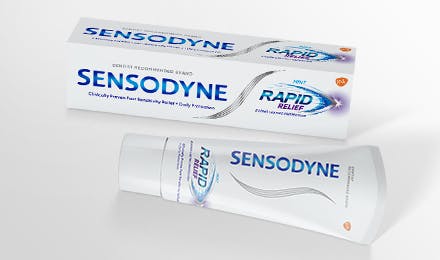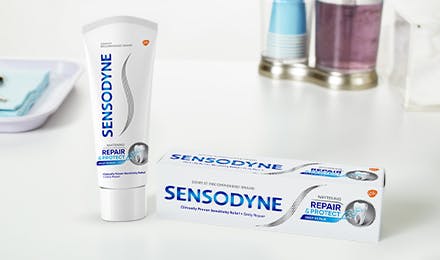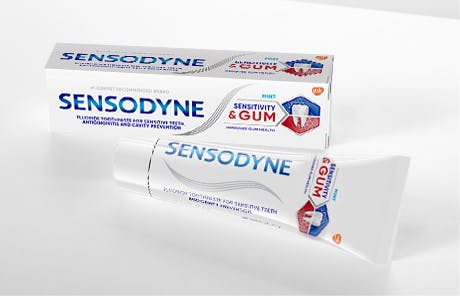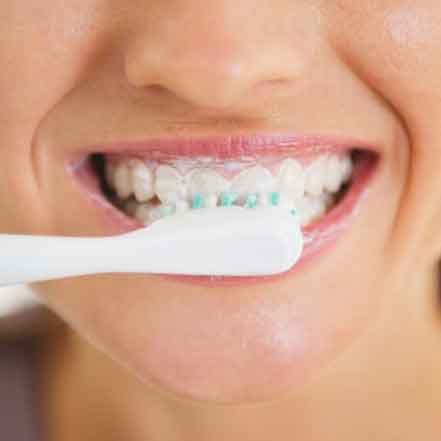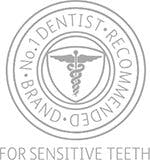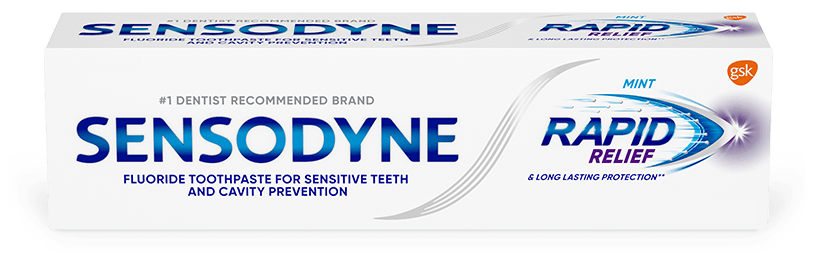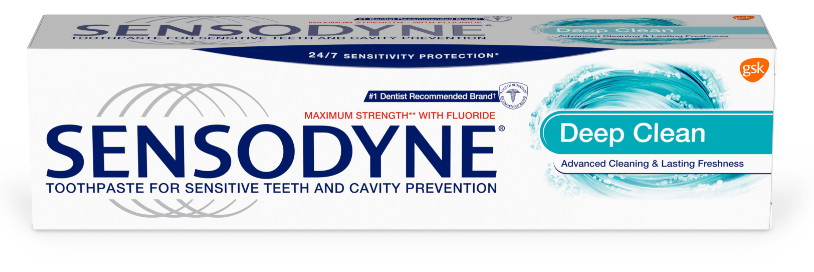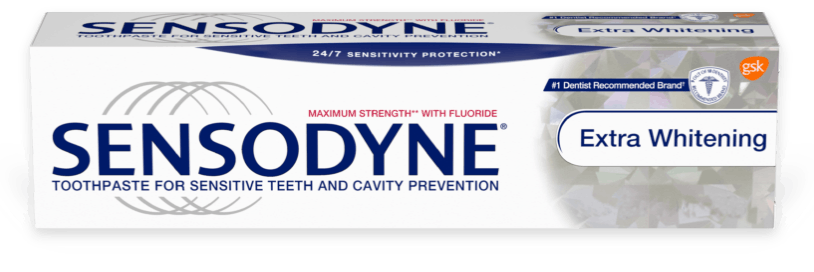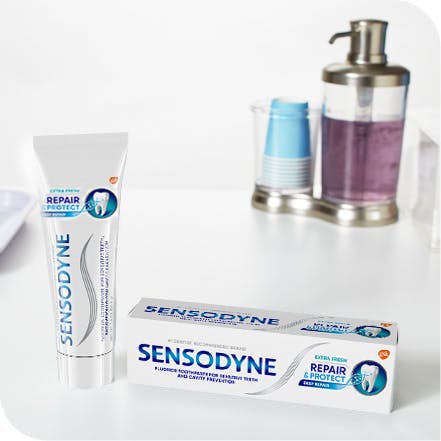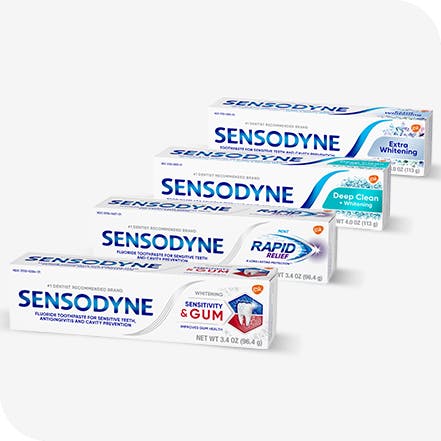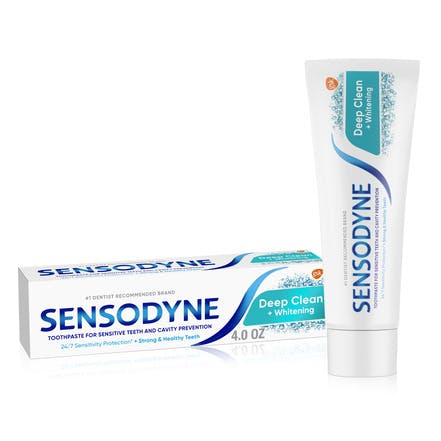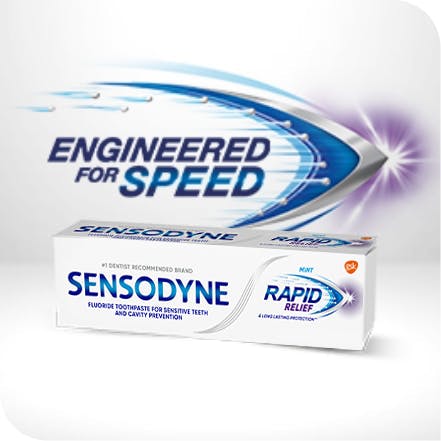
Why Sensodyne?
Our mission is to provide daily protection from tooth sensitivity.* Since 1961, Sensodyne has been creating toothpastes specifically designed to help people overcome tooth sensitivity pain* while still providing other benefits such as cavity protection* and breath freshening.
With nearly 60 years of commitment to providing effective protection for your sensitive teeth*, it’s no wonder that Sensodyne is the #1 dentist-recommended toothpaste brand for sensitive teeth.
*With twice-daily brushing
How Sensodyne Works – Which Sensodyne Toothpaste Is Right for You?

STANNOUS FLUORIDE

POTASSIUM NITRATE
Sensodyne offers a range of toothpastes for sensitive teeth pain relief, with stannous fluoride or potassium nitrate as a desensitizing ingredient.1, 2
Potassium nitrate works by depolarizing the nerve or by soothing the nerve.1
Stannous fluoride works by blocking dentin tubules, reducing sensitivity.1, 2
Sensodyne's product range can help you select the toothpaste that is best for your sensitive teeth.
Sensodyne toothpastes with potassium nitrate or with stannous fluoride help protect against teeth sensitivity when you brush twice daily. Benefits may include:
Cavity protection*
Teeth strengthening
Protection against decay
Whitening
Learn how Sensodyne toothpastes help manage sensitive teeth and protect against sensitivity pain*, so you can choose the best Sensodyne toothpaste for you.
*With twice daily brushing.
Symptoms of Sensitive Teeth
If eating and drinking certain foods and beverages or breathing in cold air causes tooth sensitivity pain, this may be a sign of sensitive teeth.3
Sensitivity occurs when the dentin layer in your teeth becomes exposed. Symptoms of sensitive teeth can include a sharp, shooting pain in the teeth.3 Depending on the cause of your tooth sensitivity, the extent of the pain can vary and may only affect the teeth in a particular area of your mouth, or even just a single tooth. Common triggers of tooth sensitivity include:3
Hot or cold foods and drinks
Sweet foods and drinks
Acidic foods and drinks
Cold air
Causes of Sensitive Teeth
Sensitive teeth can be caused by several different common dental issues, for example:4
Dental erosion: Erosion caused by acidic foods and drinks over time (like sodas, sports drinks, and fruit juices) can wear away the tooth enamel and cause sensitivity.4
Brushing too hard: Brushing your teeth too aggressively (also called toothbrush abrasion) may wear away the protective enamel on your teeth.4
Gum recession: Receding gums can expose the root of the tooth, leading to sensitivity.4
If you’re unsure whether you have sensitive teeth or the cause of your sensitive teeth, speak to your dentist. They can recommend the treatment and pain relief best suited to you.
Discover Sensodyne’s range of products to help relieve tooth sensitivity here.
Our Commitment to Sensory Inclusion
Brushing teeth can be uncomfortable, especially for those with sensory sensitivities.5 The experience of brushing can invoke uncomfortable sensations: strong flavors and smells, foaming textures, the sound of brushing.5
Sensodyne understands these challenges and is committed to raising awareness through its Sensory Inclusion Initiative, launched in early 2025. In partnership with the American Dental Association (ADA) and leading sensory accessibility nonprofit, KultureCity, Sensodyne is equipping dental professionals with training designed to help them better support patients with sensory needs with a goal of creating more inclusive oral care experiences. Sensodyne also offers important free information for sensory sensitive patients around what to expect when visiting the dentist’s office and how to talk to your dentist about sensory needs.
Which Sensodyne Toothpaste Is Right for You?
Sensodyne offers a wide range of products that, with twice-daily brushing, provide lasting relief for sensitive teeth.
Whitening
Fast Relief
Gum Protection
Extra Fresh Breath
- Dentinal Tubule Occluding Effect of Potassium Nitrate in Varied Forms, Frequencies and Duration: An In vitro SEM Analysis. PMC. https://pmc.ncbi.nlm.nih.gov/articles/PMC3908806/. Accessed 07/11/2025.
- Stannous Fluoride in Toothpastes: A Review of Its Clinical Effects and Likely Mechanisms of Action. PMC. https://pmc.ncbi.nlm.nih.gov/articles/PMC11942899/. Accessed 07/11/2025
- Sensitive Teeth: Why They Hurt and How to Stop the Pain. John Hopkins Medicine. https://www.hopkinsmedicine.org/health/conditions-and-diseases/sensitive-teeth. Accessed 07/07/2025.
- Sensitive teeth. Oral Health Foundation. https://www.dentalhealth.org/sensitive-teeth. Accessed 07/08/2025.
- Meeting your child's sensory needs - Toothbrushing. NHS Borders. https://www.nhsborders.scot.nhs.uk/media/971598/Meeting-your-childs-sensory-needs-Toothbrushing.pdf. Accessed 07/08/2025.
SOURCES
Ongoing Relief with Sensodyne
Brushing with Sensodyne toothpaste every day is important because it may take some time to feel relief. Maintaining good oral care habits and following the tips below can help treat sensitive teeth.
Brush 2x a day, every day, with Sensodyne
Use a soft-bristled or electric toothbrush.
Floss daily
Make flossing a part of your daily routine.
Visit your dentist
Schedule a checkup every 6 months.


